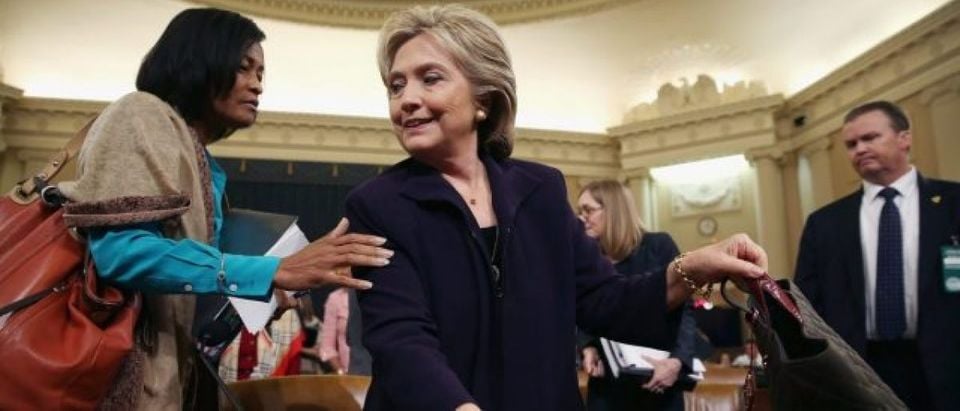The Obama administration is refusing to shed light on a Jan. 2013 conference call that could shed light on whether Hillary Clinton and her top aides thwarted Freedom of Information Act requests for her emails.
Emails show that Heather Samuelson, a Clinton lawyer who worked at the State Department, was scheduled to take part in a Jan. 7, 2013 conference call to discuss a FOIA request filed in Dec. 2012 for Clinton’s emails with Sheryl Walter and Karen Finnegan, two records management officials who worked for State.
The discussion in that call would help shed light on why the State Department later declined that FOIA request even though Clinton used a personal email account, a fact which was known to dozens of State Department and Obama administration officials.
Clinton and her team have denied that her private email system was intended to escape the reach of FOIA. But some Clinton critics have noted that her State Department improperly denied several requests for her emails filed while she was in office.
Samuelson, who would later conduct the review of Clinton’s emails before they were given to the State Department in Dec. 2014, was also aware of Clinton’s email practices when she was in office. The absence of information from the Obama administration leaves open the question of whether Samuelson denied during that conference call that Clinton used a private email account. The other possibility is that Samuelson discussed the account but that the State Department still decided to deny the FOIA request, which was filed by the watchdog group Citizens for Responsibility and Ethics in Washington (CREW).

Heather Samuelson (via LinkedIn)
The State Department has refused to “speculate” what was discussed in the conference call. Samuelson has not responded to numerous requests for comment. Finnegan and Walter, both of whom now work at different federal agencies, also declined interview requests.
The existence of the Jan. 7, 2013 conference call was first revealed in an email that the State Department released to Judicial Watch back in July. The email shows that Walter, formerly the director of information programs and services at State, organized the call.
The Dec. 6, 2012 request from CREW was for information about any email accounts that Clinton may have used. The watchdog, which is now under the control of pro-Clinton operative David Brock, filed the request after several Obama administration officials were found to have used pseudonymous email accounts.
The State Department denied the request on May 2013. But in addition to the conference call with Samuelson, other emails show that on Dec. 11, 2012, a State Department lawyer informed Clinton’s chief of staff, Cheryl Mills, about the FOIA request. She acknowledged receiving the email but appears to not have helped fulfill the FOIA request. (RELATED: Hillary’s State Department Aides Ignored Records Request For Her Emails In 2012)
Mills, who now works as Clinton’s lawyer and is Samuelson’s boss, was also well aware of the Democratic presidential candidate’s email usage.
Walter now works for the U.S. Courts system as general counsel in the administrative office. Finnegan is director of administration and management at the Defense Department.
A spokeswoman for the U.S. Courts’ administrative office told TheDC that Walter declined an interview request. A Defense Department spokesman told TheDC that Finnegan’s supervisor, Barbara Westgate, declined an interview request on Finnegan’s behalf.
Samuelson and Mills have not responded to numerous email requests. The State Department has also not attempted to find out what was discussed in the call.
“We are not going to speculate about what was discussed on this conference call,” State Department spokesman John Kirby told TheDC in a statement last month.
Kirby said that the FOIA request “has been covered extensively in the press” and was reviewed by State’s inspector general.
What Kirby avoided acknowledging in his statement is that State’s IG, in a report released in January, faulted Mills and the State Department for providing an “inaccurate and incomplete” response to the CREW request and others filed under FOIA. (RELATED: IG: State Dept. Gave ‘Inaccurate’ Responses To FOIA Requests For Clinton Emails)
Mills’ negligence is not a surprise given her involvement in other cover-ups and shady FOIA dealings. In April 2012, Mills cleared the release of a memo that discussed interrogation techniques used during the George W. Bush administration. (RELATED: Clinton Aide Was Allowed To Clear State Department Records Requests)
The Wall Street Journal reported last year that Mills intervened in FOIA requests for documents related to the Keystone XL pipeline, telling State Department officials that she wanted to review the documents before release. As Clinton’s chief of staff, reviewing documents requested under FOIA was not part of Mills’ job description.
Mills came under further scrutiny on Sunday with the release of an email showing that Clinton campaign chairman John Podesta believed that she did not want Clinton to run for president because of the looming email fiasco. (RELATED: Podesta Believed Cheryl Mills Suggested Hillary Use Private Server, Didn’t Want Her To Run For President)
In the email, Podesta also speculated that Mills is the person who encouraged Clinton to use an off-the-books email account.


